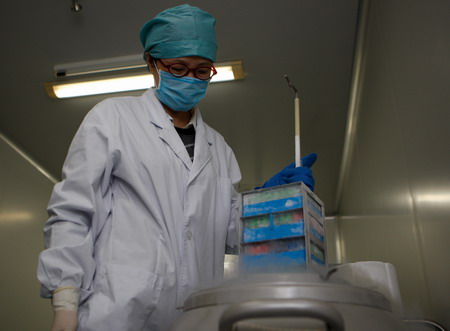Focus
Sperm shortage breeds frustration
By Cui Jia (China Daily)
Updated: 2010-11-15 07:50
 |
Large Medium Small |
|
|
Taking up time
The regulations set by the Ministry of Health are simple: only healthy men between the ages of 22 and 45 can give sperm once in their lifetime. Gay men and foreign nationals are prohibited.
Some banks also encourage people from China's many ethnic groups and prefer donors to be at least 170 centimeters tall and hold a college degree, traits that top most couples' wish lists.
However, becoming a donor can often prove far from easy.
"I thought it was a one time thing but it's actually not," said Feng, a 23-year-old classmate of Wang Jian who also went to the clinic (he did not want his full name to be used). "It's too time-consuming."
Feng said he changed his mind about donating when he discovered the process can take more than 10 months.
Men must visit a sperm bank three times for initial tests and undergo blood screening if their sample makes the grade. They then have to return 10 to 15 times to donate. Six months after the last collection, donors receive a final test for HIV.
University students like Wang and Feng form the core of China's national sperm donation system. Statistics show they represent more than 50 percent of the men who visit the Beijing bank, with the proportion rising to 70 percent in Shanghai and 85 percent in East China's Shandong province. Married men account for the remainder.
"Students are much more open-minded than elder generations," said Chen in Beijing, although he admitted the ideal donor is already married with a child.
Tang Lixin, director of the sperm bank in Guangzhou, capital of Guangdong province, said his clinic has had some success cooperating with student unions.
"Union members normally talk to students one on one in private about sperm donation, which works for us, although it takes time," he said, adding the bank used to promote its services with posters and leaflets but it proved ineffective.
In September this year, Li Zheng, director of Shanghai's sperm bank, gave a lecture at the city's Fudan University and Tongji University to raise awareness. Shortly after, more than 300 students reportedly contacted his clinic.
One thing that has helped attract young people to donate is the cash incentives. Sperm banks pay 200 yuan ($30) for each donation, depending on the quality, as well as a bonus of up to 1,500 yuan after the final blood test.
"It's only part of the reason (I wanted to donate) but I have to say, 3,500 yuan is very attractive to me because it could cover a year's tuition fee. What I need to do for it is not difficult," said Wang.
Chen explained that it is illegal to trade sperm in China, "so we don't pay for sperm. Instead we offer a reasonable amount of cash to cover the transport costs and the donors' hard work".
Chongqing's sperm bank, the only one in Southwest China, has remained closed since late last year following a sperm trading scandal. Three managers and two employees were sentenced to between seven and 12 years in prison for earning 440,000 yuan by selling 1,000 sperm samples, mostly to medical clinics providing unlicensed insemination services.
